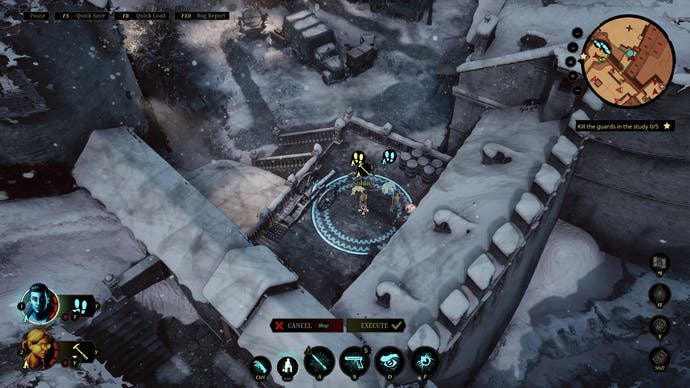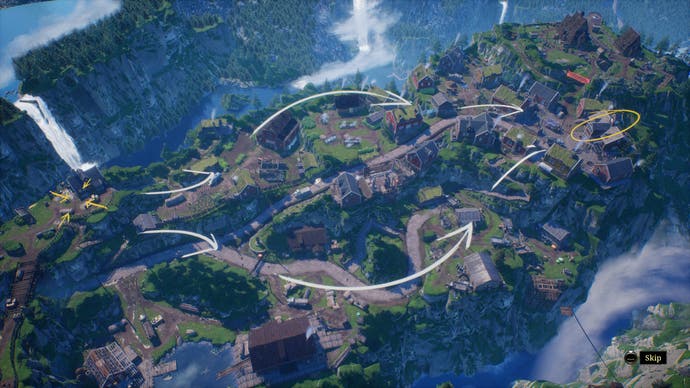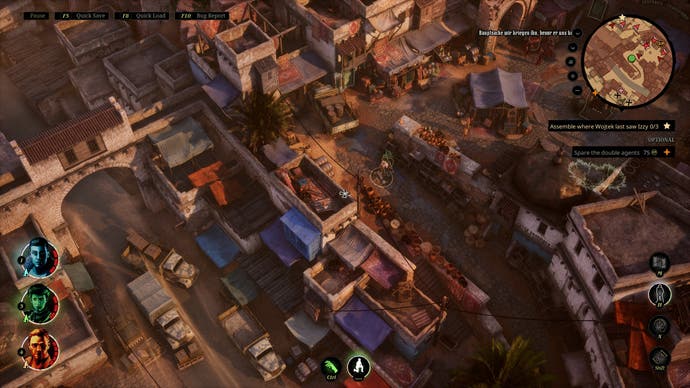Sumerian Six - a pulpy, Nazi-bashing stealth-tactics treat
Quietly brilliant.
It's hard not to talk about Sumerian Six without summoning the spirit of the sadly now defunct Mimimi Games. Sumerian Six might technically owe its existence to the real-time, sight-cone-dodging stealth-tactics classics of the 90s and early 2000s - think Commandos and Desperados - but Mimimi's wonderful genre refinements, seen in the brilliant likes of Shadow Tactics and Shadow Gambit: The Cursed Crew, are in ample evidence as developer Artificer's rip-roaring, globe-trotting, Nazi-bashing pulp adventure unfolds. But for all its mechanical familiarity, Sumerian Six is - as I approach the seven-hour mark, at least - an absolute hoot, an inventive, richly conceived take on the genre that more than holds its own.
It's 1944 and, as our story begins, cocky young adventurer Sid Sterling is attempting to locate his sister Isabella in a Nazi-infested castle somewhere in the snow-covered Alps. Isabella has been working undercover to keep tabs on scientist (and scoundrel) Hans Kammler, a former member of her father's disbanded Enigma Squad, who's been experimenting with a mysterious, devastatingly powerful substance known Geistoff - one that might, if the Sterlings can't put a stop to it, win the Third Reich's war.
Sumerian Six is properly rip-roaring comic book stuff, full of pulpy action, globe-spanning adventure, and wise-cracking heroes, that - with its witty banter, warm camaraderie, and a wonderfully weird soundtrack - is an immediately winning affair. And it's a gorgeous thing too, its expansive stages - or at least the mountaintop Nazi HQ, verdant German countryside, vertiginous Moroccan-inspired city, and sprawling factory in the heart of the desert I've seen so far - absolutely packed with detail.
More than that, though, they're cleverly designed tactical playgrounds, full of diverging pathways, discrete challenge sequences, and optional areas containing XP-boosting crates that encourage exploration and just feel rich with possibilities (I also can't get enough of the heist-movie-like cutscenes outlining possible plans of attack at the start of each mission, utilising scribbled overlays and twirling camera crash zooms). There's a good amount of variety within levels too; one segment might present a more puzzle-y challenge requiring you to think about your toolkit and navigate enemies in specific ways, while others take a more sandbox-y approach, and the organic ebb and flow is enormously satisfying.
Sumerian Six certainly doesn't reinvent the stealth-tactics genre, but it's creative, thoughtfully designed, and enormously fun to play.
That obviously wouldn't be the case if Sumerian Six's moment-by-moment tactical action wasn't up to much, but, so far, it's a pleasure to play. Mechanically, there won't be too many surprises for anyone who's experienced a stealth-tactics game in the last 30 years: it offers a familiar dance of tense sight-cone avoidance and environmental exploitation, borrowing liberally from across the genre's lifetime - including more than a few modern-day refinements from Mimimi Games. You'll scour maps for safe routes and environmental advantages, creep through foliage and crawl behind cover, crouch through jagged sightlines, hide bodies, slip through doors that belch you out elsewhere in a level, lay down markers to study who can see what and when, queue up actions to unleash simultaneously, and so on.
But Sumerian Six carves out its own niche with its wonderfully pulpy spirit and a wildly entertaining toolkit. So far, I've unlocked five playable characters (different missions bring different characters into play, meaning you're constantly forced outside your comfort zone if you're the kind of person to lean heavily on tried-and-tested strategies) and they're all wonderfully diverse, sporting complementary abilities that are a joy to experiment with. Isabella, for instance, can turn invisible for a set number of steps or instantly swap places with enemies (science! if you're wondering how all this is explained in-game), while her brother can go gung-ho with a noisy pistol, or sort-of possess opponents, hitching a ride and hopping from Nazi to Nazi as they pass each other on patrol.
Exiled chemist Rosa Reznick, meanwhile, is an absolute delight, with some truly fiendish tricks up her sleeve. She can root enemies to the spot with an IV drip, melt them into a puddle so their bodies don't need to be hidden (this isn't a quiet process, however), or turn them into walking bombs - useful for taking out groups of their cohorts as they patrol on by. Alistair Sterling commands lightning and can access hilariously entertaining directional spring traps, while Wojtek, when he's not distracting enemies with a well-time bottle toss, can maul them to death by turning into a werebear. It all adds up to an enjoyably flexible toolkit that's rich in tactical potential - bolstered by varied enemy design requiring subtle shifts in strategy, and a gradual progression of new environmental wrinkles, including reinforcement alarms, ability dampeners, and deadly barriers.




Sumerian Six certainly doesn't reinvent the stealth-tactics genre, but - from what I've played at least - it's creative, thoughtfully designed, and enormously fun to play. It is, though, a little lacking in polish, my playthrough marred by issues that make the whole thing feel sloppier than is ideal. I've had abilities suddenly stop working without a reload, crashes when trying to access quick saves from other levels, enemies being alerted to my movements way outside the indicated noise range, sight cones refusing to display for no obvious reason, weirdly inconsistent enemy placement on quick loads, and more. Thankfully, none of this is a regular enough occurrence that it detracts from what Sumerian Six gets right, but there's definitely a sense it could have done with a bit more cooking time.
I am, though, having a blast with Sumerian Six, tinkering around with its inventive toolkit and unleashing sneaky, Nazi-felling mayhem across its cleverly designed world. I was worried Artificer might struggle to impress after Mimimi Games' wonderful Shadow Gambit - not to mention last month's stellar genre-adjacent Tactical Breach Wizards - but Sumerian Six is a pleasure so far and, issues of polish aside, a wonderful surprise.


